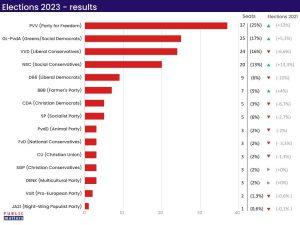UPDATE DUTCH POLITICS – Far-right leader Geert Wilders shock winner general election
Freedom Party (PVV) is set to win almost 25% of the vote
Highlights
With 98% of votes counted far-right leader Geert Wilders is expected to be the big winner of yesterday’s general election – winning 37 seats (of 150 seats in total).
Frans Timmermans’ Labour-Green alliance (GroenLinks-PvdA) is likely to take second place (25 seats) and the VVD (Liberal Conservatives, the party of current PM Mark Rutte – now led by Dilan Yeşilgöz), which was leading the polls for quite a while, is in third place (24 seats). A new political party set up by former Christian Democrat Pieter Omtzigt – Social Conservatives (NSC) – was the other big winner – with 20 seats.
This election was characterized by intense competition between the biggest 4 parties and a large number of swing voters, making it one of the most unpredictable in recent history.
Forming a new coalition government will be challenging: at least 3 or 4 parties will be needed for a majority in the House of Representatives, the relations between muliple party leaders aren’t very good and some parties have indicated they will never enter a coalition with the PVV of Geert Wilders (including GroenLinks-PvdA and NSC) .
———————————————————————————————————————————————————-
Election results
The “day after” election day (November 22, 2023) it’s safe to expect that far-right leader Geert Wilders will win the general election. His party (PVV – Party for Freedom) won by a landslide (37 seats).
GroenLinks-PvdA, combining the Greens and Labor, emerges as the second-largest party (25 seats, and the previously dominant VVD (Liberal Conservatives) experiences a significant drop (24 seats), now ranking as the third party. Pieter Omtzigt’s new party, NSC (Social Conservatives), makes a notable entrance as the largest of the new parties (20 seats).
This election was characterized by intense competition between the biggest 4 parties and a large number of swing voters, making it one of the most unpredictable in recent history.
The voter turnout so far is 79,3% – which is a bit more than the turnout of the general elections in 2021 (78,7%) and the final result is expected on 1 December.
Forming a new coalition government will be challenging
Forming a new coalition government will be a challenging: at least 3 or 4 parties will be needed for a majority in the House of Representatives, the relations between muliple party leaders aren’t very good and some parties have indicated they will never enter a coalition with the PVV of Geert Wilders (including GroenLinks-PvdA and NSC) .
Geert Wilders has been calling on other parties to seek common ground to cooperate – to prevent Frans Timmermans from coming to power. He prefers a center-right cabinet and sees potential for cooperation with VVD and NSC, which would create a workable majority of 81 seats. Other parties, such as NSC (Pieter Omtzigt) and VVD (Dilan Yesilgöz) might be willing to “jump over their shadows” to form such a cabinet. However, this remains to be seen.
A progressive coalition, preferred by GroenLinks-PvdA, seems unlikely due to the limited size of logical allies such as D66 (Liberal Democrats) and of course the big win by the PVV. In addition, forming such a coalition would require at least 4 parties, and would be difficult as many voters of the VVD and GroenLinks-PvdA seem negative about such a coalition.
Surveys show that more than a third of the voters would like to see the PVV in a new cabinet, followed by VVD and NSC.
Key issues in the formation discussions will include asylum and migration, the housing market, poverty and income inequality, healthcare, climate change and a ‘new governance culture’.
Next steps (indicative)
Following the chaotic 2021 cabinet formation, which lasted 299 days, the House of Representatives adopted several reforms for a smoother and more transparent formation process. These reforms include the intended appointment of a single “explorer” by the largest party, stricter deadlines for the “informateur” to accelerate the process, and the introduction of possible hearings to assess the qualifications of cabinet candidates.
Party leaders will meet coming Friday (24 November) to discuss the initial steps of the cabinet formation process. The largest party (PVV) is expected to appoint an “explorer” to evaluate potential coalition options. A report by this explorer is expected by 5 December.
The newly elected Members of Parliament will be officially installed on 6 December, and they will choose their new Chair on 13 December.
On 7 December there will be a debate in the House of Representatives focused on the election outcomes and the cabinet formation process, following the explorer’s report. This will lead to the appointment of an “informateur”, whose role is pivotal in exploring coalition possibilities.
An important task of the informateur is to lead the negotiatons of a coalition agreement, which could take at least 4-6 months or longer.
Following the informateur’s report, a “formateur” will be appointed, often the future prime minister, to assemble the new cabinet. When the new ministerial team is complete, the new cabinet meets for a consultation (the ‘constituent consultation’), after which the cabinet is sworn in before the King.

Public matters







